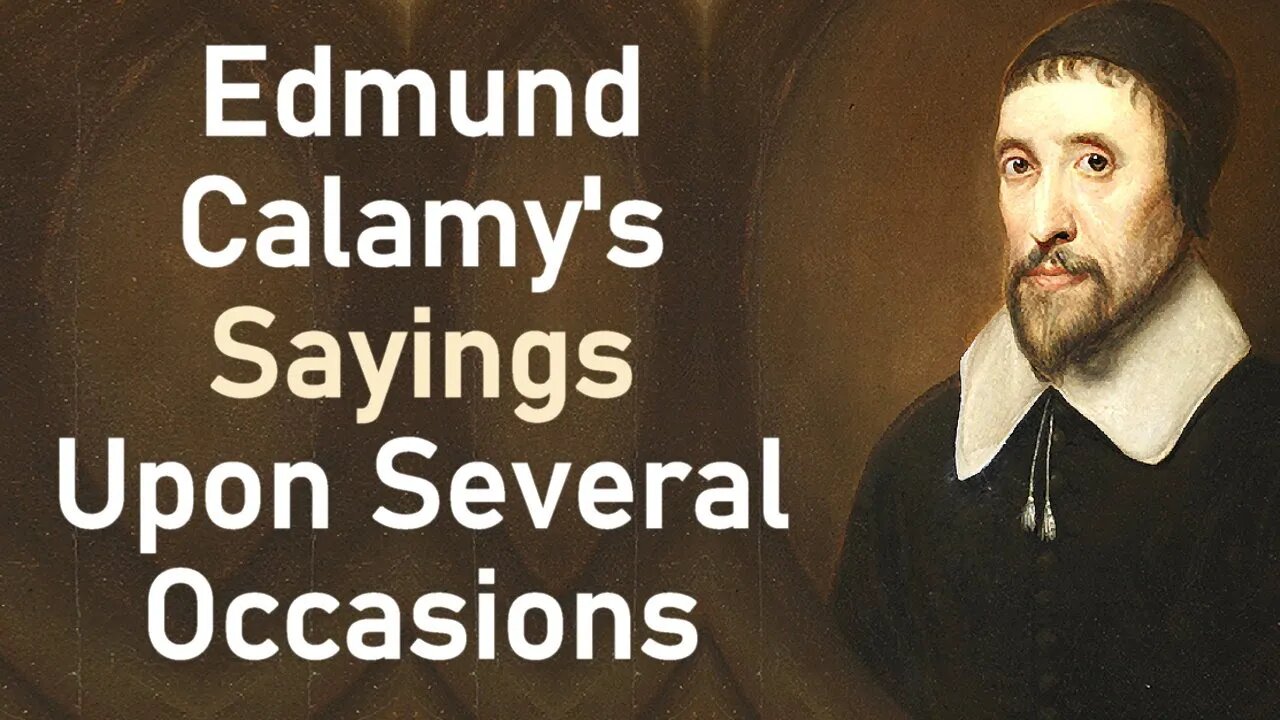Premium Only Content

Old Mr. Edmund Calamy's Former and Latter Sayings upon Several Occasions
▶️My Twitter page https://twitter.com/RichMoo50267219 Dangers of Neglecting Meditation - Puritan Edmund Calamy Christian Audio Books
▶️SUBSCRIBE: https://www.youtube.com/user/stack45ny
▶️After subscribing, click on NOTIFICATION BELL to be notified of new uploads.
▶️Odysee: https://odysee.com/@RichMoore
▶️My WordPress blog: https://sermonsandsongsdotorg.com/
▶️Telegram: https://t.me/ChristianSermonsAndAudioBooks
▶️RUMBLE https://rumble.com/c/c-278901
▶️Battle for God's Truth https://battleforgodstruth.blogspot.com/
▶️MeWe: https://mewe.com/i/richardmoore91
▶️Instagram: https://www.instagram.com/richmoore63/
▶️Minds https://www.minds.com/RichNY
▶️Battle for God and His Truth: http://battleforgodstruth.tumblr.com/
▶️Charles Spurgeon - Daily Inspirations from Great Christians: https://www.facebook.com/CharlesSpurgeonDailyInspirations
▶️Christian Devotional Readings: https://www.facebook.com/ChristianDevotionalReadings
▶️GETTR: https://gettr.com/user/christianty
▶️Please watch: "A Call to Separation - A. W. Pink Christian Audio Books / Don't be Unequally Yoked / Be Ye Separate"
https://www.youtube.com/watch?v=CBDg7u21cKY
Old Mr. Edmund Calamy's Former and Latter Sayings upon Several Occasions
Biography of Edmund Calamy (1600-1666):
Edmund Calamy (February 1600- October 29, 1666) was known as “the elder” he was an English Presbyterian church leader.
Of Huguenot descent, he was born in Walbrook, London, and educated at Pembroke College, Cambridge, where his opposition to the Arminianism excluded him from a fellowship. Nicholas Felton, Bishop of Ely, nevertheless made him his chaplain, and gave him the living of St Mary, Swaffham Prior, which he held till 1626. He then removed to Bury St Edmunds, where he lectured for ten years, retiring when his bishop (Wren) insisted on the observance of certain ceremonial articles. In 1636 he was appointed rector (or perhaps only lecturer) of Rochford in Essex, but had to leave for the sake of his health. In 1639 he was elected to the perpetual curacy of St Mary Aldermanbury in London, where he had a large following.
At the opening of the Long Parliament he distinguished himself in defence of the Presbyterian cause, and contributed to the conciliatory work known as Smectymnuus, against Bishop Joseph Hall’s presentation of episcopacy. The initials of the names of the several contributors formed the name under which it was published, viz., Stephen Marshall, E Calamy, T Young, Matthew Newcomen and W Spurstow. Calamy was an active member in the Westminster assembly of divines, and, refusing to advance to Congregationalism, found in Presbyterianism the middle course which best suited his views of theology and church government. He opposed the execution of King Charles I, lived quietly under the Commonwealth, and was assiduous in promoting the king’s return; for this he was afterwards offered the bishopric of Coventry and Lichfield, but declined it, perhaps for his wife’s sake.
He was made one of Charles’s chaplains, and vainly tried to secure the legal ratification of Charles’s declaration of October 25, 1660. He was ejected for Nonconformity in the Great Ejection of 1662, and was so affected by the sight of the devastation caused by the Great Fire of London that he died shortly afterwards. He was buried in the ruins of his church, near the place where the pulpit had stood. His publications are almost entirely sermons.
His eldest son Edmund Calamy “the younger”, followed a similar religious path, and was ejected from the rectory of Moreton, Essex, in 1662. He was of a retiring disposition and moderate views, and died in 1685.
-
 41:42
41:42
Christian Sermons and Audio Books
5 months agoGod's Purpose for Suffering in the Lives of Christians - Pastor Patrick Hines Sermon (Psalm 61:1-2)
3621 -
 3:05:00
3:05:00
TimcastIRL
6 hours agoTrump Floats Accepting 600,000 Chinese Student Visas, MAGA Uproar | Timcast IRL
194K125 -
 8:44:47
8:44:47
SpartakusLIVE
11 hours ago$20,000 Hide and Seek Tourney w/ Stonemountain64 || #1 Rat wins the BIG CHEESE
62.3K -
 2:34:02
2:34:02
Barry Cunningham
7 hours agoLISA COOK | ADAM SCHIFF | LETITIA JAMES | ARE THEY BEING SACRIFICED BY THE DEEP STATE?
89.4K53 -
 1:36:19
1:36:19
Flyover Conservatives
15 hours agoOnly 17% of Millennials Hit These 5 Adult Milestones—Why?; What If Childhood Trauma Is Behind Your Health Problems? - Dr. Troy Spurrill | FOC Show
32.6K4 -
 4:49:04
4:49:04
HogansAlleyHero
16 hours ago💥CHASING DOPAMINE💥✅TRUMP SAYS BATTLEFIELD IS THE BEST✅
41.8K3 -
 1:57:40
1:57:40
MattMorseTV
7 hours ago $10.90 earned🔴Trump just SHATTERED the PROJECTIONS.🔴
54.3K50 -
 2:32:19
2:32:19
megimu32
6 hours agoOTS: From Star Search to Superstardom
38.7K4 -
 1:56:21
1:56:21
Joker Effect
5 hours agoInterviewing GREENMAN! Looks like he is coming to Rumble! Let's give him a warm welcome! REAL TALENT
23.7K1 -
 1:07:21
1:07:21
Anthony Rogers
12 hours agoEpisode 380 - Is Pain All In Your Head?
16.6K3